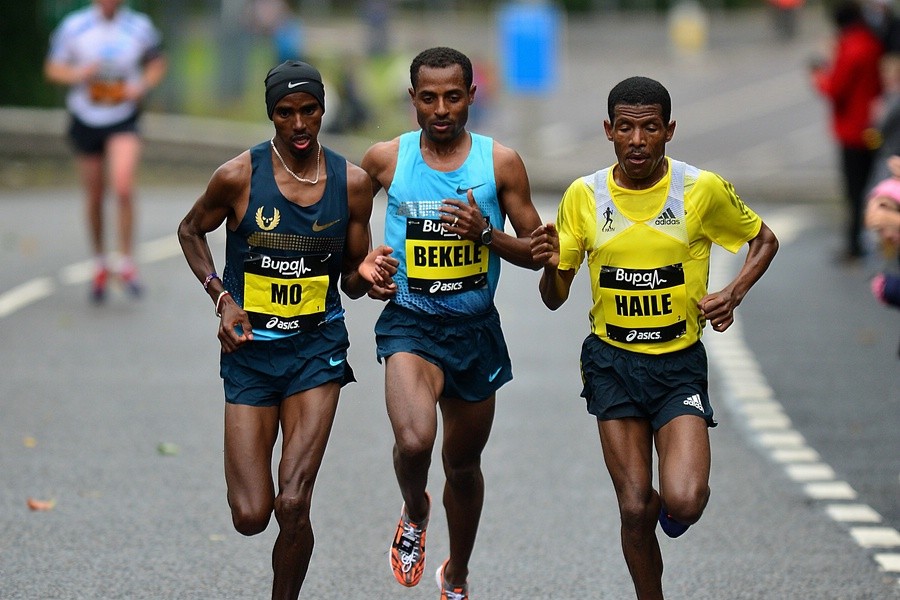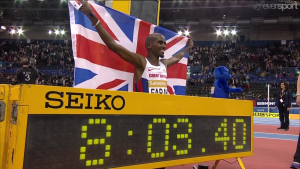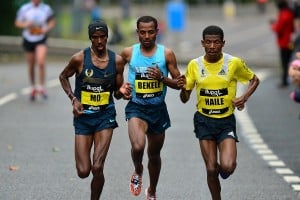The LetsRun.com Staff Civil War: Can Mo Farah Be Considered The GOAT (Greatest of All-Time)?
by LetsRun.com
February 26, 2015
Editor’s note: During its weekly Monday morning teleconference, the LetsRun.com team got into a heated argument about Mo Farah being potentially the GOAT – great of all time. Some of us found it to be a ludicrous thought – others (well one guy) not so much. We decided to carry on the debate on a google document. Here is our back and forth. LRCs Robert Johnson, Jonathan Gault, Steven Soprano, Weldon Johnson and John Kellogg participated.
Robert: In recapping Mo Farah‘s world record, Jonathan claimed it was time to start considering Farah for GOAT – greatest of all time status:
Five global golds (with the possibility of more to come), including back-to-back 5k/10k doubles at the Olympics and World Championships is a lot and starts to put Farah in the discussion for greatest track distance runner of all-time.
When I read that, I about fell out of my chair. I spit out my Coke and actually had to tone down what he wrote.
Now Jon is British. Or can I say that? If someone called Farah African he’d probably take offense to it. Let me rephrase that: Jon was born in Britain, so maybe he’s a little biased.
To be fair, having talked to Jon, he realizes that Farah needs to do a lot more to be considered the GOAT ahead of Kenenisa Bekele or Haile Gebrselassie as his 5000 and 10,000 pbs are MUCH slower.
How much more does he need to accomplish? Well why don’t we let Jon tell us? Jon make the case for Farah being the GOAT if he accomplishes x, y, and z over the next few years.
Jonathan: One thing I started thinking about when we had this discussion is what criteria we use to consider whether someone is the GOAT and how the relative weight of that criteria changes over time. I told Robert that if Farah sweeps the 5k/10k at Worlds this year and the Olympics next year, it’s going to be very hard to say he isn’t what I wrote he could be in the WR recap — the greatest track distance runner of all-time.
Here’s what he would have on his resume:
5 World Championship gold medals (equal to Bekele, one more than Geb)
4 Olympic gold medals (one more than Bekele, two more than Geb)
He’d join Lasse Viren as the only man to have pulled off the 5k/10k double twice at the Olympics. He’d also be the only man to have done the 5k/10k double twice at Worlds (currently, he and Bekele are the only ones to have even done it once). And his stretch from 2012-2016, encompassing an entire Olympic cycle plus one year, would have to rank as the most dominant stretch every by a distance runner on the track.
Farah has made it clear that gold medals matter a lot more to him than records, and I personally put more stock in medals in evaluating an athlete’s greatness than what their PR is. I don’t think it’s fair to penalize Farah for having a 26:46 10k pb (vs. 26:17 for Bekele and 26:22 for Geb) in an era in which no one runs the 10k for time anymore. All-Athletics.com says Farah has only run eight 10,000s on the track, of which just two came in non-championship settings (and one of those was in 2008, well before his prime). Bekele has run 17, with nine in non-championship settings; Geb has run 28, with 11 in non-championship settings. Bekele ran as many 10,000s for time in 2005 as Farah has in his entire life. Do I think Farah could have run 26:17 in 2012? Probably not. But I’m not sure how relevant that is.
Of course, you can also say that Farah’s gold medals at 10,000 aren’t as valuable as Bekele’s — or, especially, Geb’s — given that the talent pool for the 10,000 is not as deep as in the past. 10-15 years ago, guys like Dennis Kimetto or Wilson Kipsang would be in the 10,000 at the Olympics, but the influx of money into the marathon has made it so that Farah avoids them entirely. This isn’t Farah’s fault — he can only beat who shows up — but it’s something to think about.
The way I see it, double gold in both Beijing and Rio will make Farah the greatest track distance runner of all-time, regardless of whether he sets any more world records. But Bekele and Geb both have something outside of the track that bolsters their argument for greatest distance runner of all-time — cross country for Bekele and the marathon for Geb. So for Farah to surpass them, he’d need to do more than just sweep the golds. He’d need to accomplish one of the following (I’m assuming he switches to the marathon after 2016):
-win multiple major marathons
-run the marathon world record/or marathon pb of 2:03:30 or better
-win Olympic marathon gold (he’ll be 37 in 2020)
-break Bekele’s 5k world record
If you add one of the accomplishments above to double gold in 2015 and 2016 (or maybe just three golds total, depending on what else he accomplishes), I think he’s the greatest distance runner of all-time.
***
Robert: So we are already putting a disclaimer on it? Greatest track distance runner? I thought we were talking about greatest distance runner.
Jonathan: What do you want to argue? My point in the WR analysis was track distance runner but we can argue greatest distance runner, period. I started my response with the track thing though before moving to greatest distance runner, period.
Steve: Jon, I could at least take you seriously when you were arguing for greatest all time track runner. But overall GOAT (so including the marathon)? Seriously?
Is Mo Farah one of the greatest distance runners of all-time? Obviously yes. With the number of global medals he’s accumulated you can’t argue against that. But to call him the GOAT? As in the best among the best? I’m with Rojo, no way.
I was surprised and impressed that Farah actually went for a world record and got it in the 2-mile at Birmingham. However, let’s take a step back and reiterate that it was the indoor 2-mile. Clearly one of the softer records on the books when you compare it to the outdoor records or the indoor 3000 (13 men have run faster than the equivalent 3000 time). So this doesn’t do a heck of a lot when you’re trying to argue for GOAT status.
Now on to the medals. Clearly Farah is an excellent racer and winning 5K/10K golds at multiple championships puts him in a rare category. However, his medals have come at a time where the top Kenyans and Ethiopians in the world are moving to the marathon/roads for the big money and the competition on the track is definitely watered down.
Just look at the names Bekele was racing against when he won his Olympic medals in 2004 and 2008. He had to beat guys like Haile Gebrselassie, Eliud Kipchoge and the only reason he didn’t get double gold in 2004 was because he lost to a guy by the name of Hicham El Guerrouj in the 5000 by .2-seconds.
Who did Farah have to beat in 2012? An older Bernard Lagat and a Bekele coming back from injuries. The watered-down nature of the competition is proven by the fact that Farah’s biggest competition in the 10,000 was his training partner Galen Rupp. Rupp might be one of the greatest US runners of all-time, but it stops there. When Bekele was winning, he was racing other guys who themselves were among some of the greatest ever in our sport.
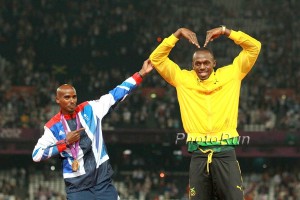 Mo Farah and Usain Bolt
Mo Farah and Usain Bolt
Robert: Thank you Steve. Farah is dominating on the track in an era when much of the top African talent has left for the marathon. If a tree falls in a forest, does it make a noise? If a guy wins a 10k and no one is in it, what does it mean?
Did you see the Q&A last week with Lelisa Desisa of Ethiopia? He complained about having to run the 10,000 trials:
Unfortunately that year as it was an Olympic year and I was forced by the Ethiopian Federation to run the 10,000m trials in Hengelo that year and was not able to go to the Rotterdam Marathon that year; where I felt my shape was the best.
Now to be honest, that’s not fair to Farah. He is INCREDIBLY GOOD. With his speed, he’d be a match for any of the greats. Also with the sport being so global now and fully professional, I’m not sure that there really is a total lack of talent on the track as there are so many more pros than 20 years ago.
I’m not sure what Farah would have to do to become the GOAT for me. Even just the track. He’d likely have to win a gold medal at a third Olympics. Yes, third. 2020. Yes, I know he’s racking up a lot of medals on the track. But Geb never even tried the double. In part because back in the day you had to run a lot of rounds.
In 1996, there were two rounds of the 10,000 and three rounds of the 5,000. So to win double gold, you had to run five races. Now you only have to run three.
Without an outdoor record, I don’t think even a gold in 2020 would do it for me with Farah. Are we supposed to just ignore the first 10 years of his career when he was average? Like if a boxer is a journeyman and goes 13-15 in his first 28 fights but then wins his last 20, can he be considered the GOAT? He still lost a lot of fights.
Farah lost A LOT of races. Those are blemishes on his resume like LeBron’s supposed quit in Cleveland in 2010 and choke against Dallas in the 2011 Finals. Bekele was a world junior champion in cross country at age 18.
Weldon: I like how Robert pondered what it would take for Farah to be the GOAT for him. It’s almost impossible. It would take a ton. That shows a lot of this is a gut feeling.
Farah is competing in a weakened era on the track. Another thing that goes against him for the subjective GOAT status is that Farah was an also-ran on the world scene until he switched to coach Salazar. It’s hard for some people to switch their perception of him from also-ran to GOAT. Bekele and Gebrselassie didn’t have that problem as they were world-beaters at an early age.
One disagreement with Jon, if Farah wins double gold this year and next year, that makes him the most credentialed track runner of all-time, not necessarily the greatest track runner of all-time. Viren has more Olympic golds than Bekele and Gebrselassie but no one is arguing Viren is the GOAT. Usually, we think with time the runners get better and better, but that isn’t the case now on the track.
I think we really are comparing eras. Viren was the best of his era on the track. Gebrselassie the best of his era on the track and the era after that at the marathon. Bekele was the best of his era on the track and XC. Farah already is the best of his era on the track.
To compare across eras people often look at world records. And that is where Farah is severely lacking.
Jonathan: Steve, you mentioned Lagat and Bekele were the best guys Farah had to beat in 2012. That’s nonsense.
Check out the all-time list at 5000 meters:
- Kenenisa Bekele, 12:37.35
- Haile Gebrselassie, 12:39.36
- Daniel Komen, 12:39.74
- Eliud Kipchoge, 12:46.53
- Dejen Gebremeskel, 12:46.81
- Sileshi Sihine, 12:47.04
- Hagos Gebrhiwet, 12:47.53
- Isiah Koech, 12:48.64
- Isaac Songok, 12:48.66
- Yenew Alamirew, 12:48.77
- Saif Saaeed Shaheen, 12:48.81
- Thomas Longosiwa, 12:49.04
I’ve bolded the guys he beat at the 2012 Olympics. He beat Bekele in the 10,000 (not the 5,000), and Bekele obviously wasn’t the same runner in 2012 as he was in 2004/2008. But to say he wasn’t beating good guys is ridiculous. Take away Farah’s recent dominance and Gebrhiwet and Gebremeskel would have gold medals and sub-12:50 pbs. We’d view them as total studs.
Robert: Jon, stop typing, you are obliterating Steve. As I said above, there certainly is talent on the track. The perception is that it’s just missing and I think that stems in large part the ways the world championship races have been run. There’s been no teamwork and the guys have in retrospect handed Farah gold medal after gold medal in sit and kick affairs.
But back to Jon up above making excuses for Farah’s 10,000 pb. Why does it matter how many times he’s run it? Bekele ran 26:25.97 at Pre in the morning. When he ran his WR, he only had a rabbit for 5000. With coach Salazar arranging a rabbit for Galen Rupp’s AR for what 9,000 meters last year, Farah has no excuses for not running a fast 10,000 or 5,000. With Salazar’s resources behind him, that Prefontaine 10,000 for Bekele could have been a WR as the race would have been at night with a packed crowd and top-notch pacers.
You act like championships are all that matter. No, the regular season matters as well. Please take a look at theses stats:
# of sub-13 Performances
Kenenisa Bekele – 21
Haile Gebrselassie – 18
Mo Farah – 3
#sub-27:30 Performances
Haile Gebrselassie – 18
Kenenisa Bekele 15
Mo Farah – 4
The sport is on its way to oblivion if we only count the Olympic and World Champs.
Jonathan: I’ll concede that point. Championships aren’t all that matters. But they are all that matters to Farah right now. Would his PRs be better if he cared about fast times? Absolutely. Would they be better than Bekele’s and Geb’s? I lean toward no, but we’ll never be quite sure.
One problem I do have with your argument is your point that Farah wasn’t good until the later part of his career. He didn’t win his first global medal until he was 28 years old. That’s ancient, right?
Well guess how many outdoor gold medals Bekele and Geb won, COMBINED, at age 28 or older?
Zero. Farah has five and counting.
Obviously Bekele and Geb weren’t just puttering around after they turned 28 — Geb, especially, was still very formidable, setting marathon world records.
But Bekele didn’t race at all in 2010, DNF’ed Worlds in 2011, failed to medal in the Olympics in ’12, didn’t race Worlds in ’13 and DNF’ed his most recent marathon in January. Yes, Bekele’s post-2009 career is much better than Farah’s pre-2011 career, but if Bekele starts to really struggle in the marathon and Farah puts together another 3-4 solid years, they’ll have had around the same time at the top.
Robert: You are forgetting one thing in there. Well, two things. Yes, Bekele didn’t race Worlds in 2013 even after winning the Pre Classic as the idiotic Ethiopian federation didn’t select him. But he did beat Farah – just a few weeks after worlds: LRC Kenenisa Bekele Holds Off Mo Farah In One Of The Most Thrilling Road Races In History – 2013 BUPA Great North Run.
I don’t see how Farah getting good at age 28 is a positive for him. He’s got a ton of losses to make up for. A bad year for Bekele or Geb after they stopped being a force on the track was still way better than a good year for Farah before he started being good on the track.
Weldon: Let’s talk about losses to make up for.
Lifetime head to head wins from http://www.tilastopaja.org/
Kenenisa Bekele 13 vs Mo Farah 4
Kenenisa Bekele 7 vs Haile Gebrselassie 0
Haile Gebrselassie 1 vs Mo Farah 1
Can the GOAT really be someone who has a lifetime record of 4-13 vs someone else up for GOAT status?
Steve: Jon, yes, ok, Lagat was not his biggest competition in London. I was making the point that one of his key competitors was a 37-year-old who was 4th.
But Rojo is really getting to the crux of the matter with talking about times. Farah isn’t the GOAT because he’s not as fast. When it comes down to it, what is the point of running? To run as fast as you can.
Yes, Farah places a lot of emphasis on winning rather than times, but I think that’s a total cop-out. The guys before him ran fast and won medals. Jon, you posted the all-time 5000 list. Bekele is 1st (12:37), Gebrselassie is 2nd (12:39), Kipchoge 4th (12:46). Mo Farah is 31st at 12:53. It’s the same in the 10,000 where Bekele’s WR is 26:17, Gebrselassie is 2nd all-time with 26:22 and Farah is down in 16th at 26:46.
Bekele, Gebrselassie and Kipchoge have all had success with their move to the marathon and ran 2:05 or better. Farah’s attempt put him 3-minutes slower at 2:08:21. He hasn’t run as fast as them because he’s not as good as them. Farah is good at sitting and kicking in tactical races to win medals. But to be the GOAT you should be able to back it up with fast times as well.
Rojo: Steve, please. The point of running is to race.
“When it comes down to it, what is the point of running? To run as fast as you can.”
No it’s not. In reality, the pointing of running was initially to run faster than the thing that was pursuing you or that you were pursuing so you could eat, not be eaten. So the point of running has always been to race. Of course, using this neolithic definition wouldn’t really help Farah too much as his sit and kick affairs wouldn’t apply. In a fight for survival, you’d better be fast from the gun. But the point isn’t to be as fast as possible but just faster than everyone else.
Steve: Yes, Rojo, the point is to win races, but a huge emphasis is placed on running as fast as you can. Why do you think there is so much hype around the “mythical 2-hour marathon”? Why was it such a big deal when Roger Bannister broke the first sub-4 minute mile? Yes, in the professional world of racing, obviously the point is to win the race, but as a sport as a whole, putting up the most impressive times in the world still means something. Dennis Kimetto isn’t as big a deal as he is because he won Berlin. It’s because he broke 2:03.
You shouldn’t be able to say “my emphasis is on winning, not fast times” and still be in consideration for GOAT. A huge part of the sport is about running fast. Otherwise why should we bother keeping track of world records if the times don’t matter? In it’s purest form, running is about being fast. When you started out as a runner in middle school, that was the goal. It’s also the goal for millions of recreational runners.
Winning a championship that happens every 4-years is a man-made arbitrary construct. As you pointed out, it can even change over time with the addition or subtraction of rounds in the 10,000 for example. Running a world record, being the fastest ever, breaking new barriers is a constant.
And I’m not arguing against the importance of medals. I’d agree that an Olympic gold is more desirable than a world record. But to be GOAT you should have both.
Wejo: Steve is correct on one thing, most runners are trying to run as fast as they can. Racing for them is often a time trial. Only the winner and a few select competitors have a chance to win. That is why I think time is so important in running.
But if we want to focus on world records, does that mean we need to talk about drug testing? Despite the evidence suggesting Bekele over Gebrselassie, Gebrselassie is my GOAT. I will acknowledge however that he set his records when there wasn’t an EPO test. I really hope he was clean, but it wouldn’t surprise me if he wasn’t. People can argue that even time isn’t an arbitrary measurement across eras.
Robert: Not sure if anyone has anything else to say. I quite enjoyed this. I’m already thinking of other topics. Who is the GOAT – Bekele or Geb? Who is most likely to have been/be dirty between Haile, Bekele or Farah? Well not sure if the lawyers would approve that one.
In terms of GOAT status, I’d argue Tergat is > Farah if we aren’t talking just track. If it wasn’t for Geb, Tergat would be a 5-time world xc champ when world xc was really important, 2-time Olympic champ and former world record holder at 10,000 and the marathon.
Steve: I didn’t really factor doping that into my thinking because in our sport any athlete at the top has to be under at least some level of suspicion. If you want to believe a recent Dutch study, about 14 to 39% of elite athletes dope. Not including the LetsRun staff, there are 25 elite runners mentioned in this article. Even hoping for the best, that means 3.5 of them have cheated. Trying to figure out which athlete among those we’ve mentioned is the most likely to be a doper is getting too subjective.
JK (John Kellogg): With a few more gold medals, Farah will have to be acknowledged as the best in terms of global track championship honors won. But in terms of overall status, I’d put both Paul Tergat and (barely) Sileshi Sihine ahead of Farah. They didn’t win any WC or OG golds, but their losses came to the two runners who are truly up for discussion as GOAT.
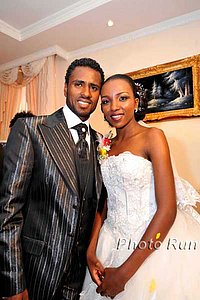 Sileshi Sihine may have often settled for silver on the track, but he won gold off it. His bride is Tirunesh Dibaba. *More Sihine-Dibaba wedding photos
Sileshi Sihine may have often settled for silver on the track, but he won gold off it. His bride is Tirunesh Dibaba. *More Sihine-Dibaba wedding photos
Tergat ended up with 5 silvers and a bronze in global track championships, losing to Geb every time (and also to Khalid Skah in one of those affairs). But here’s where the “overall” concept comes into play: Tergat was a superstar on every surface, winning 5 World Cross titles and 2 World Half golds and set WRs in the 10,000, the half marathon and the marathon (and possibly a few other distances en route). He ran faster than Farah has so far at every distance from 3,000 to the marathon (except the 2-mile, where Farah’s mark might be a teeny bit better than Tergat’s 3,000), and times definitely do matter. The stopwatch is the best standard for comparison across eras. It’s why track athletes from different eras can be compared, as opposed to athletes who play a sport with a ball in it. Who knows if Ted Williams really was a better hitter than Albert Pujols? So many variables come into play without having a means of assessing absolute performance, as you can (for the most part) in track and field. Yes, faster track surfaces, professional rabbits and better “gear” (cough, cough) assist today’s runners, but it’s safe to say that a 26:17 performer is simply a better runner than Lasse Viren was with his 27:38, even though the latter was a WR and gold medal-winning mark.
On to Sihine – His record isn’t as complete as that of Tergat (no XC or road titles and no WRs), but in my mind, his 5 silvers and a bronze in global championships might actually rank up there with Farah’s golds. Five times he lost to Bekele (and also to Geb in one of those races) and once he lost to Benjamin Limo. If not for the man many do consider the GOAT, Sihine could very well have won 4 golds. This is mere speculation, obviously, so how can I say that Sihine might have been a better track runner than Farah has been so far? Because he, like Tergat, ran faster than Farah has to date at 3,000, 5,000 and 10,000. Could he have beaten Farah all those times? Of course we can’t know, but the man had the second-best kick in the business behind perhaps the best kicker (and definitely the fastest performer) in history and was also faster on the stopwatch than Farah. He’s not as decorated, but I think he might have been better.
So far, Farah is nowhere near Geb and Bekele in terms of overall accomplishments. He’s going to need to win some more huge races and/or set some world records on the track and at least one other surface before he has his name thrown into the hat for GOAT runner.
What do you think? Tell us on the messageboard: MB: With 5 world titles and a WR, is Mo Farah the GOAT (Greatest of all-time)? We say yes…(and hell no).
*MB: Mo Farah is one of the greats.
